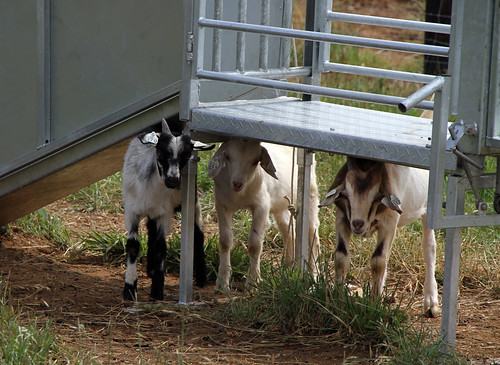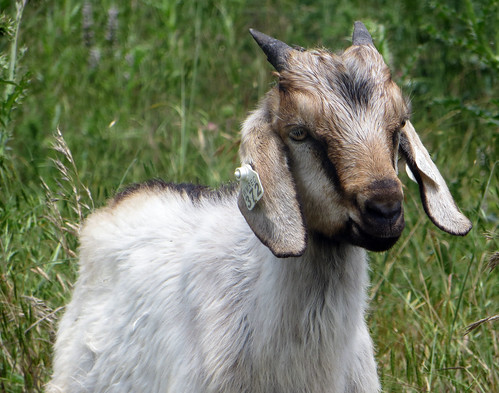Last week, 29 of the 81 goats in the test had a FAMACHA© score of 3. Ten of those bucks were dewormed with levamisole (Prohibit @ 1.5x the sheep dose). The bi-weekly decision to deworm a goat is based primarily on the evaluation criteria of the Five Point Check©.
 To address the limitations of the FAMACHA© system, which is only useful for worms that cause anemia (e.g. barber pole worm), South African scientists developed the Five Point Check©. The Five Point Check involves five check points on the animal: 1) ocular membranes (FAMACHA© score); 2) jaw (bottle jaw); 3) back (body condition score); 4) tail (dag score); and 5) nose (nose bots).
To address the limitations of the FAMACHA© system, which is only useful for worms that cause anemia (e.g. barber pole worm), South African scientists developed the Five Point Check©. The Five Point Check involves five check points on the animal: 1) ocular membranes (FAMACHA© score); 2) jaw (bottle jaw); 3) back (body condition score); 4) tail (dag score); and 5) nose (nose bots).
The Five Point Check was developed for sheep. For goats, it is suggested that the nose check point be replaced with coat condition, as nasal bots are not considered to be a significant problem in goats.
If a goat has a FAMACHA© score of 4 or 5, the other four check points are not as important since the goat already requires deworming for Haemonchus. If a goat has a FAMACHA© score of 1 or 2, the additional check points may lead to a decision to deworm a non-anemic goat. For example, regardless of FAMACHA© score, a goat with bottle jaw will always be dewormed.
All parasites can cause a loss of body condition and affect the condition of an animal's hair coat. Many worm species can cause diarrhea (e.g. Trichostrongylus spp). Thus, poor scores in these categories could also lead to a decision to deworm a goat with a FAMACHA© score of 1 or 2.
The Five Point Check© is most useful when determining the need to deworm a goat with a FAMACHA score of 3. There is no treatment recommendation on the FAMACHA© card for 3's. There is only a question mark (?). Some animals may require deworming; others may not.
Generally, it is recommended that adults, especially sheep, with FAMACHA© scores of 3 not be dewormed; whereas kids and lambs should be dewormed. Over the years, we have found that it is often not necessary to deworm a buckling when he has a FAMACHA© score of 3. This assumes he is otherwise healthy and gaining weight.
In the test
In the test, we are more likely to deworm goats (with FAMACHA© scores of 3) that are in poorer body condition, have rougher hair coats, and have higher dag scores. Worsening scores, especially FAMACHA© scores, are another indication that a goat would benefit from deworming. For example, we are more likely to deworm a goat whose FAMACHA© score has declined from 2 (or 1) to 3 than a goat who always has a FAMACHA© score of 3.
We look at the most recent fecal egg count, though keep in mind, it is from two weeks prior. Fecal egg counts are also only marginally useful for determining the need to deworm an individual goat.
Weight gain is another criteria that we use to determine the need to deworm a goat with a FAMACHA© score of 3. Obviously, we are more likely to deworm a goat that has lost weight in the previous two week period than one that has gained weight or maintained its weight. Goats with FAMACHA© scores of 4 or 5 have typically lost weight, though this is not always true with FAMACHA© 3's.
We will also look at the overall trend in parasitism when deciding what to do with the goats with FAMACHA© scores of 3. If we are seeing growing numbers of parasitized (anemic) goats, we are more likely to deworm goats with FAMACHA© scores of 3. This contributed to the decision to deworm the ten goats (with FAMACHA© scores of 3) last week.
One year, we dewormed all the goats with FAMACHA© scores of 3 (in the early part of the test) when we had concerns (and supporting data) that the multiple dosing with anthelmintics was not very effective (only 35%). This occurred in the year when we were unable to obtain levamisole for the test. Levamisole has tended to be the most effective anthelmintic we have used in the test.
If your FAMACHA score 3 goat was dewormed
Since the decision to deworm a goat with a FAMACHA© score of 3 is more subjective (and sometimes done as a precaution), dewormings that result from FAMACHA© scores of 3 will not disqualify a goat from making the sale.
In addition, parasitic conditions can change from year-to-year (and this one has the makings of a "bad" year); thus, the standards for Gold, Silver, and Bronze could change, much like the rate-of-gain standards can changed from year-to-year.
We are looking for the goats that are the most resistant and resilient to internal parasites. No goat is completely resistant! The goal of this year's test is to determine which of the 81 bucks consigned have the most genetic resistance and resilience to gastro-intestinal parasites. These are the bucks that should be used for breeding.
 To address the limitations of the FAMACHA© system, which is only useful for worms that cause anemia (e.g. barber pole worm), South African scientists developed the Five Point Check©. The Five Point Check involves five check points on the animal: 1) ocular membranes (FAMACHA© score); 2) jaw (bottle jaw); 3) back (body condition score); 4) tail (dag score); and 5) nose (nose bots).
To address the limitations of the FAMACHA© system, which is only useful for worms that cause anemia (e.g. barber pole worm), South African scientists developed the Five Point Check©. The Five Point Check involves five check points on the animal: 1) ocular membranes (FAMACHA© score); 2) jaw (bottle jaw); 3) back (body condition score); 4) tail (dag score); and 5) nose (nose bots).The Five Point Check was developed for sheep. For goats, it is suggested that the nose check point be replaced with coat condition, as nasal bots are not considered to be a significant problem in goats.
If a goat has a FAMACHA© score of 4 or 5, the other four check points are not as important since the goat already requires deworming for Haemonchus. If a goat has a FAMACHA© score of 1 or 2, the additional check points may lead to a decision to deworm a non-anemic goat. For example, regardless of FAMACHA© score, a goat with bottle jaw will always be dewormed.
All parasites can cause a loss of body condition and affect the condition of an animal's hair coat. Many worm species can cause diarrhea (e.g. Trichostrongylus spp). Thus, poor scores in these categories could also lead to a decision to deworm a goat with a FAMACHA© score of 1 or 2.
 |
| "Hiding" from the parasites! |
The Five Point Check© is most useful when determining the need to deworm a goat with a FAMACHA score of 3. There is no treatment recommendation on the FAMACHA© card for 3's. There is only a question mark (?). Some animals may require deworming; others may not.
Generally, it is recommended that adults, especially sheep, with FAMACHA© scores of 3 not be dewormed; whereas kids and lambs should be dewormed. Over the years, we have found that it is often not necessary to deworm a buckling when he has a FAMACHA© score of 3. This assumes he is otherwise healthy and gaining weight.
In the test
In the test, we are more likely to deworm goats (with FAMACHA© scores of 3) that are in poorer body condition, have rougher hair coats, and have higher dag scores. Worsening scores, especially FAMACHA© scores, are another indication that a goat would benefit from deworming. For example, we are more likely to deworm a goat whose FAMACHA© score has declined from 2 (or 1) to 3 than a goat who always has a FAMACHA© score of 3.
We look at the most recent fecal egg count, though keep in mind, it is from two weeks prior. Fecal egg counts are also only marginally useful for determining the need to deworm an individual goat.
 |
| FAMACHA© 3 |
We will also look at the overall trend in parasitism when deciding what to do with the goats with FAMACHA© scores of 3. If we are seeing growing numbers of parasitized (anemic) goats, we are more likely to deworm goats with FAMACHA© scores of 3. This contributed to the decision to deworm the ten goats (with FAMACHA© scores of 3) last week.
One year, we dewormed all the goats with FAMACHA© scores of 3 (in the early part of the test) when we had concerns (and supporting data) that the multiple dosing with anthelmintics was not very effective (only 35%). This occurred in the year when we were unable to obtain levamisole for the test. Levamisole has tended to be the most effective anthelmintic we have used in the test.
 |
| FAMACHA© Score 3: deworm or not? |
If your FAMACHA score 3 goat was dewormed
Since the decision to deworm a goat with a FAMACHA© score of 3 is more subjective (and sometimes done as a precaution), dewormings that result from FAMACHA© scores of 3 will not disqualify a goat from making the sale.
In addition, parasitic conditions can change from year-to-year (and this one has the makings of a "bad" year); thus, the standards for Gold, Silver, and Bronze could change, much like the rate-of-gain standards can changed from year-to-year.
We are looking for the goats that are the most resistant and resilient to internal parasites. No goat is completely resistant! The goal of this year's test is to determine which of the 81 bucks consigned have the most genetic resistance and resilience to gastro-intestinal parasites. These are the bucks that should be used for breeding.











